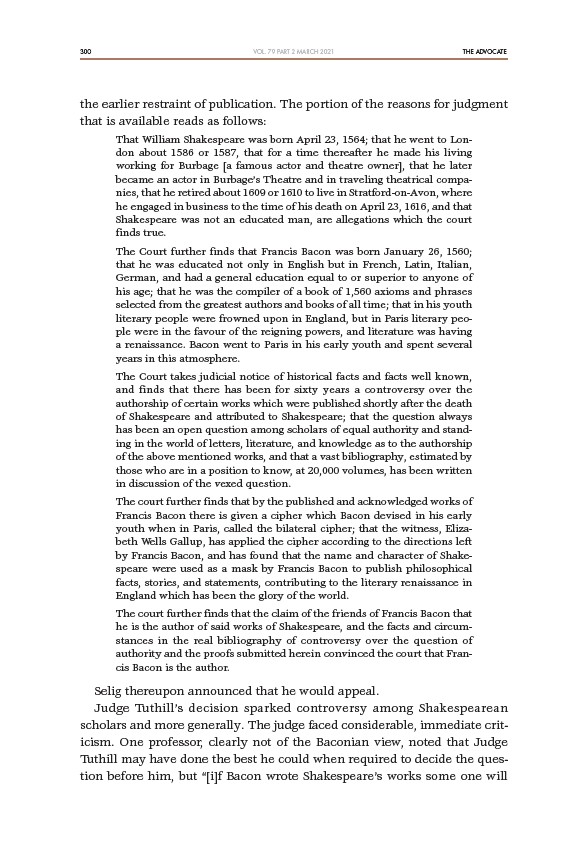
300 THE ADVOCATE
VOL. 79 PART 2 MARCH 2021
the earlier restraint of publication. The portion of the reasons for judgment
that is available reads as follows:
That William Shakespeare was born April 23, 1564; that he went to London
about 1586 or 1587, that for a time thereafter he made his living
working for Burbage a famous actor and theatre owner, that he later
became an actor in Burbage’s Theatre and in traveling theatrical companies,
that he retired about 1609 or 1610 to live in Stratford-on-Avon, where
he engaged in business to the time of his death on April 23, 1616, and that
Shakespeare was not an educated man, are allegations which the court
finds true.
The Court further finds that Francis Bacon was born January 26, 1560;
that he was educated not only in English but in French, Latin, Italian,
German, and had a general education equal to or superior to anyone of
his age; that he was the compiler of a book of 1,560 axioms and phrases
selected from the greatest authors and books of all time; that in his youth
literary people were frowned upon in England, but in Paris literary people
were in the favour of the reigning powers, and literature was having
a renaissance. Bacon went to Paris in his early youth and spent several
years in this atmosphere.
The Court takes judicial notice of historical facts and facts well known,
and finds that there has been for sixty years a controversy over the
authorship of certain works which were published shortly after the death
of Shakespeare and attributed to Shakespeare; that the question always
has been an open question among scholars of equal authority and standing
in the world of letters, literature, and knowledge as to the authorship
of the above mentioned works, and that a vast bibliography, estimated by
those who are in a position to know, at 20,000 volumes, has been written
in discussion of the vexed question.
The court further finds that by the published and acknowledged works of
Francis Bacon there is given a cipher which Bacon devised in his early
youth when in Paris, called the bilateral cipher; that the witness, Elizabeth
Wells Gallup, has applied the cipher according to the directions left
by Francis Bacon, and has found that the name and character of Shakespeare
were used as a mask by Francis Bacon to publish philosophical
facts, stories, and statements, contributing to the literary renaissance in
England which has been the glory of the world.
The court further finds that the claim of the friends of Francis Bacon that
he is the author of said works of Shakespeare, and the facts and circumstances
in the real bibliography of controversy over the question of
authority and the proofs submitted herein convinced the court that Francis
Bacon is the author.
Selig thereupon announced that he would appeal.
Judge Tuthill’s decision sparked controversy among Shakespearean
scholars and more generally. The judge faced considerable, immediate criticism.
One professor, clearly not of the Baconian view, noted that Judge
Tuthill may have done the best he could when required to decide the question
before him, but “if Bacon wrote Shakespeare’s works some one will